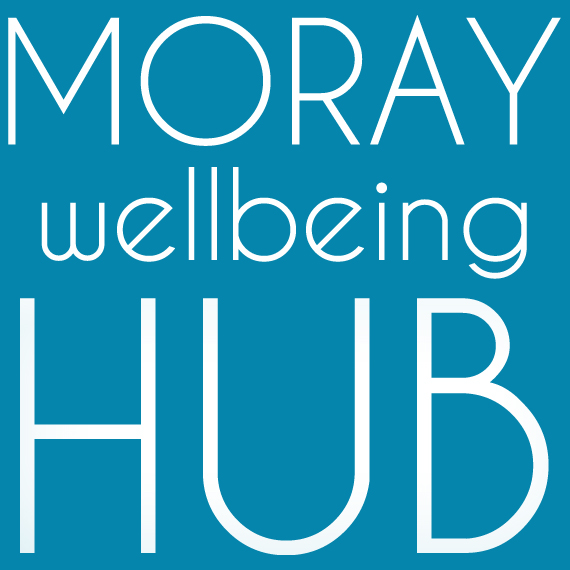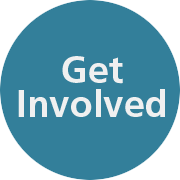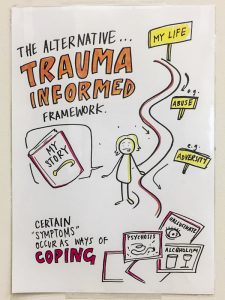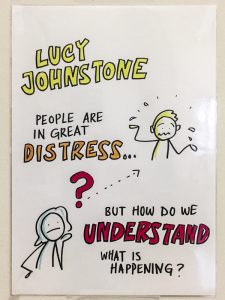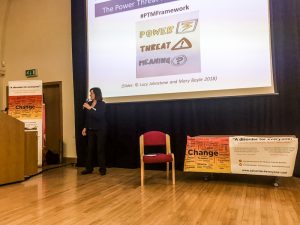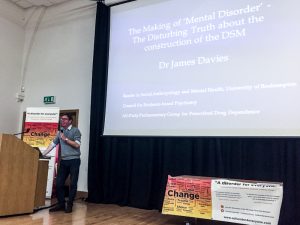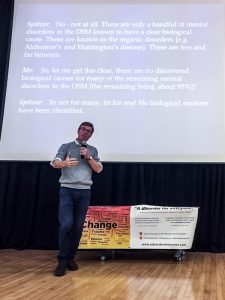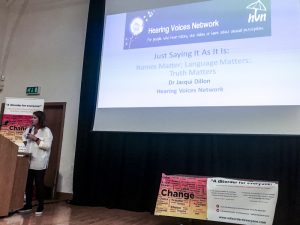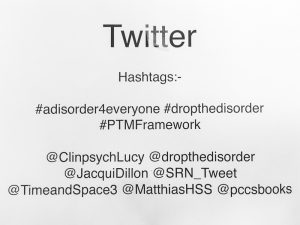Several MWH Champions recently took a trip down to Edinburgh to be a part of the ‘Disorder for Everyone‘ conference happening there on 28th September. This was an event aimed, perhaps, more at practitioners (and students of practice), but there were quite a few members of the audience with lived experience as well.
The Disorder for Everyone tagline is,
“Challenging the culture of psychiatric diagnosis, exploring trauma informed alternatives”
and that is exactly what we got on the day. You can read more about the work of the AD4E team on their website: www.adisorder4everyone.com in particular look under the ‘resources’ tab for information and videos explaining the trauma based approach.
Here are some edited reflections from Chris and Ewan who were part of our team in Edinburgh.
AD4E is a social movement, with a mission statement of,
Challenging the culture of psychiatric diagnosis
Exploring trauma informed alternatives
We arrived half way through a presentation by Dr Lucy Johnstone, a Clinical Psychologist. Her contention was that Psychiatrists approach the examination of a patient from a wrong angle – rather than asking, “How do you feel”, they should be asking, “What’s happened to you?”, an approach she calls Trauma Informed. The trauma-informed model of intervention applies across diagnostic categories: A 3 stage approach (education and stabilisation; trauma processing; reconnecting to one’s life) underpins all therapeutic work
She went on to explain about The ACE (Adverse Childhood Experiences) studies. Higher ACE scores predict greater incidence of depression, suicide, ‘psychosis’, PTSD, drug use, criminal behaviour, heart disease, cancer, STDs, lung disease, liver disease, smoking, obesity, diabetes, poor educational and work performance, homelessness, prostitution, unemployment, and early death. Concluding that ACEs act in a cumulative and synergistic way to cause complex adult psychopathology, she certainly had me convinced that her approach has great merit.
After lunch, we had a very interesting lecture from James Davies who showed that DSM-5 (Diagnostic and Statistical Manual of Mental Disorders, 5th Edition), the authoritative work on western psychiatric diagnoses, was built on a very shaky foundation of DSM-3, which introduced some 300 new mentally ill diagnoses without any peer review or corroboration, in one case causing an entry to be accepted because 2 Psychiatrists had identified people with a particular label and deleting another diagnosis because one of the judging panel said “hang on, I do that” when the symptoms were described. A successful author, his style was slick, entertaining and well-rehearsed.
Chris, MWH Champion
The main aim of the Disorder for Everyone team (AD4E) is to question the current bio-medical methods of diagnosis of mental disorders and to put forward an alternative approach based on the ‘Power, Threat, Meaning’ (PTM) framework. Dr Johnstone clearly explained what PTM was and hinted that the current diagnosis model is, largely, unscientific (more of that later). The alternative, trauma informed, framework suggests that many of what are now called ‘symptoms’ are perfectly natural coping strategies that we adopt to deal help us to overcome trauma (particularly that experienced in childhood). Hearing voices, self-harming, psychotic incidents, dependencies, depression, anxiety, hallucinations and more might all be seen in this way rather than as symptoms for particular bio-medical disorders.
After lunch I stayed in the workshop with Dr. Johnstone and she expanded on these ideas and shared with us a ‘Power Threat Meaning Framework Template’ which is used to help a person to explain and understand what has been happening to them and look to finding new ways forward. Not a lot of time was given to the exercise and I felt that it would have been far more useful if we had been asked to actually work through an example with this rather than the few minutes we were given just to read the framework and think about our own situations. It would have had so much more impact if we had, for example, been given a script for a typical person in distress to read out and then role-play that person completing the template. I have taken time after the event to have a closer look at the ideas but away from the conference this loses some of the potential impact.
Here is a quote from the PTM framework template that might help to explain the thinking:
“The PTM Framework is an alternative way of understanding why people sometimes experience a whole range of forms of distress, confusion, fear and despair, from mild to severe. This is often called ‘mental illness.’ The PTM Framework is based on a great deal of evidence which suggests that if we know enough about people’s relationships, social situations and life stories, and the struggles they have faced or are still facing, it is possible to make sense of these experiences. If we also think about people’s strengths and supports, we may be able to come up with new ways forward.”
I thought that this approach sounded like a good idea as it gives a person the opportunity to really look at all that has happened to them that might be contributing to why they are now feeling and acting as they do. This gives hope that there might be something that can be done to modify behaviour and start to cope better with life. This is in contrast to being told there is something wrong they have no control over and only some medication can help, even though there may be no actual evidence of any bio-medical dysfunction present.
The next speaker was Dr. James Davies who was to talk on ‘The Making of Mental Disorder – The Disturbing Truth about the Construction of the DSM’. The DSM is the ‘Diagnostic and Statistical Manual’ created, and updated, by the American Psychiatric Association and is used around the world as the guide book for all psychiatric disorders. It was first created in 1952 and has been amended several times, up to the current DSM 5 (2013).
Dr. Davies wrote a book called ‘Cracked: Why Psychiatry is Doing More Harm Than Good’ (2013) which he quoted extensively from during his talk. He sought out the chair, Dr. Robert Spitzer, of the DSM 3 updates – which added a large number of new ‘disorders’ in 1980. His aim was to ask why so many new disorders were added, what was the process and, crucially, was there actually any scientific evidence to back up their existence and inclusion. The answer was rather startling. Over 95% of the psychiatric disorders listed in the DSM (upon which the world relies to diagnose and treat people) have no scientific evidence to back them up at all. Many have only been observed by a few clinicians and in only a few cases.
Dr. Spitzer, when asked if there were any biological causes for many of the 95% of mental disorders in the DSM that were not known as organic disorders (such as Alzheimer’s or Huntingdon’s) said,
“It’s not for many, it’s for any! No biological markers have been identified”
So, astonishingly, the main author of DSM 3 admits that the majority of the disorders listed there (and, presumably their related medications and treatments) are not backed up by research. Dr. Spitzer was finally quoted saying,
“There are very few disorders whose definition was a result of specific research data”
Dr. Davies gave many examples of disorders added that might be considered suspect, such as one where if you grieve for more that 2 months after a loved one dies – there is now a psychiatric disorder for that!
I felt that this talk was the key to understanding why the AD4E team are so disappointed with the current diagnosis system as they believe it is not based on any particular science but more on the thoughts and ideas of a very few people. Now so much of the mental health care system and supporting pharmaceutical industry has been built on the DSM that it is obvious why the AD4E approach is getting so much of a hard time. It may well be a case of the Emperor’s New Clothes!
The final speaker, Dr. Jacqui Dillon (Hearing Voices Network), shared some of her personal experiences that reflected on the use of psychiatric diagnosis and how these can further traumatize and damage the very people they were meant to be helping. Dr. Dillon was clearly still very angry about her experiences but her manner did make it a bit hard to fully engage with the content of her talk. I think her point was that health professionals need to believe what a person tells them and not dismiss everything as a delusion.
This was a very thought provoking event which made me realise how little research has been to done to back up diagnoses and that simply asking a person to fully explain their story and try to understand why they behave as they do might prove to be more useful than just medicating them or locking them up. At times the AD4E team were a bit evangelical about their cause which came across poorly but I can forgive some of this due to the enormous pressure they must be under to not upset the global mental health care system by suggesting alternative methods to help people that do not require so much expensive medication, analysis and hospital accommodation.
Ewan, MWH Champion
To find out more go to www.adisorder4everyone.com and look up #adisorder4everyone #dropthedisorder and #PTMFramework
